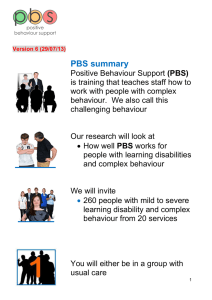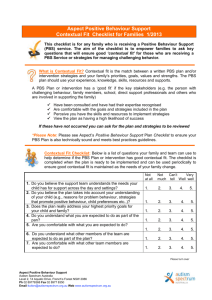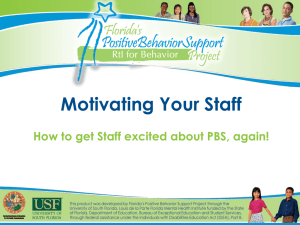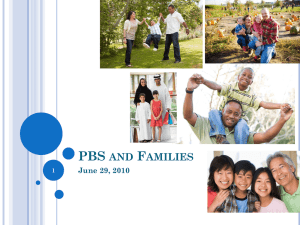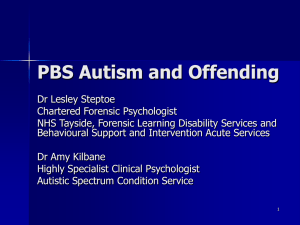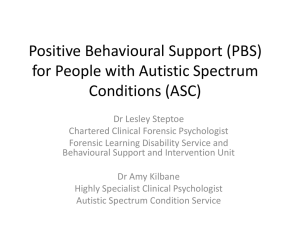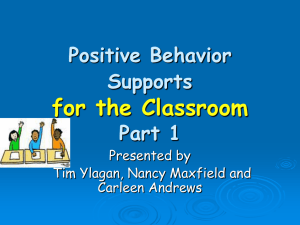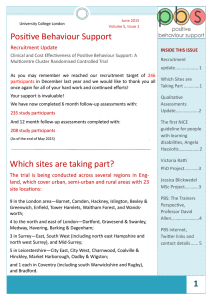How Positive behaviour support can prevent - Jan
advertisement
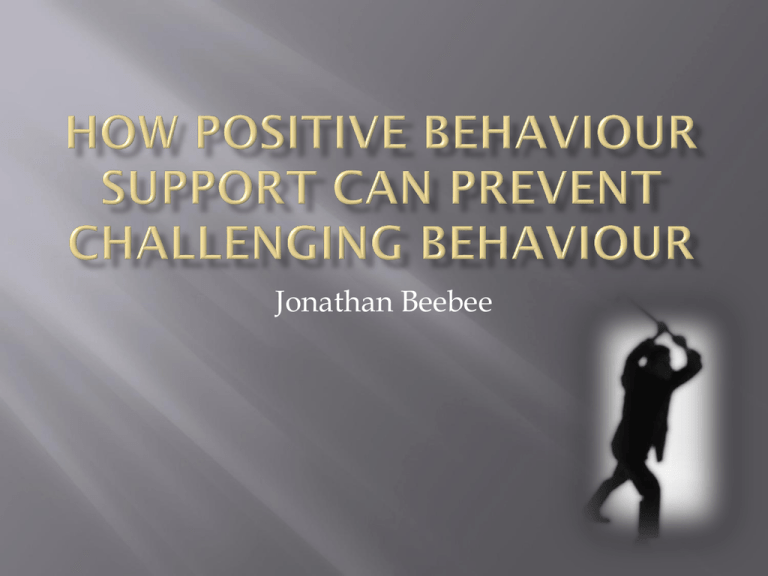
Jonathan Beebee “The Department of Health with external partners will publish guidance on best practice around positive behaviour support so that physical restraint is only ever used as a last resort where the safety of individuals would otherwise be at risk and never to punish or humiliate.” Transforming Care, DH 2012 “The core principles for commissioning and specifying services outlined below stem from PBS.” Ensuring Quality Services, LGA 2014 “Evidence has shown that PBS-based approaches can enhance quality of life and also reduce behaviours that challenge which in turn can lead to a reduction in the use of restrictive interventions.” Positive & Proactive Care, DH 2014 “Positive behaviour support is widely accepted as good evidence-based practice when supporting people with learning disabilities and/or autism who display or are at risk of displaying behaviour that is challenging.” Positive & Proactive Workforce, Skills4Care 2014 Not clearly defined in the UK. This leads to: “PBS practitioners” with no qualifications Providers claiming to do PBS as it is what everyone wants Lack of clarity when it comes to evaluating how “PBS” a “PBS plan” is Inconsistencies in practice, leading to inconsistencies in what our customers receive This all leads to a big risk that PBS will be the same old practices rehashed, or an intervention that has potential being written off because not correctly applied Positive Behaviour Support is Supporting Positive Behaviours. Not Positive behavioural approaches, not positively BS. “An approach that blends values about the rights of people with disabilities with a practical science about how learning and behaviour change occur” Horner, 2000. Science of learning (ABA) ideal for people with a disability in learning. We teach replacement skills to make challenging behaviours irrelevant, they reduce as a natural side effect “We explicitly & unashamedly use the practices of ABA to achieve culturally valued goals” Lavigna, 2012. Needs technology of ABA + values Who is competent in ABA? Competence in ABA required, at least in supervision Interviews Rating scales Review recordings Direct observations Triangulation Frequently there is not enough focus on direct observations, leading to assessments being largely based on other peoples reports. PBS aims to understand functions of challenging behaviour, then define plans to teach and promote functional alternatives. Consider a plan based upon “Ben hits himself when he wants to avoid demands. We are going to consider our primary responses to reduce this behaviour, secondary responses when there are warning signs, and reactive plans when it all goes wrong” Now consider a plan based upon “Ben hits himself in the head when he wants to avoid demands. We are going to plan to teach Ben another way to avoid demands, we will consider the environmental needs, and how he knows this new way is more effective.” One is PBS, the other is risk management. One is focussed on function, the other is focussed on behaviour. Too often the focus is solely on environments We create Disneyland’s in peoples homes that they cannot safely leave Need a larger focus on teaching skills Consider if someone has a fear of dogs. The environment control is to never go out so you don’t see a dog. https://www.youtube.com/watch?v=32yNVG CrUSk Punishment in behavioural terms ONLY refers to reduction of behaviour in the future. Not abuse, not harsh consequences – we should oppose these anyway. But punishment is not abuse - hugs can punish! Aim is to avoid aiming to provide learning through negative consequences and to avoid doing things that people don’t like Medication, physical intervention, reprimands, time out, ignoring, etc do not belong on a PBS plan. Beware of “hidden punishments”. Function based assessments Function based plans Constructive plans Enabling environments Enabling development of skills for independence Ensuring rich access to positive reinforcement If Reactive strategies are included totally nonaversive


